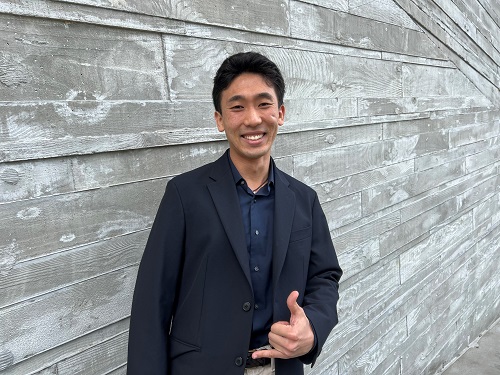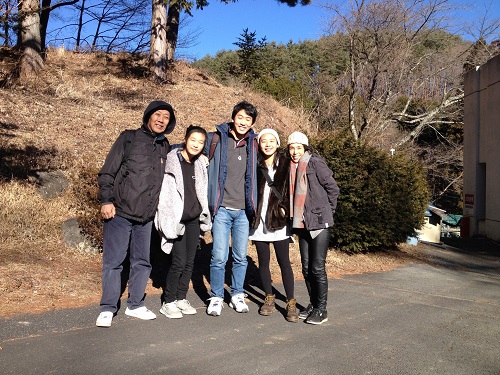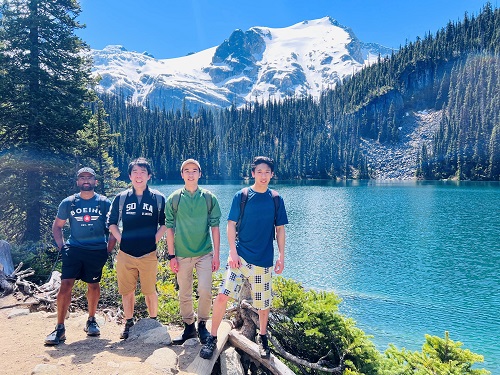Forging Indomitable Faith

By Reo Zukoshi
Clear Waters District
New Westminster, B.C.
I attended Soka Gakkai meetings from a young age, as I was born in Japan where my maternal grandparents had joined the Soka Gakkai shortly after the Second World War. As a little boy in Japan, I did not understand the Soka Gakkai organization, even though my mother often took me to district meetings. I only attended the meetings because of the refreshments, just like many other children. Another reason I didn't chant while living in Japan was because my father was against all religion, especially the Soka Gakkai. My father's love for my mother, however, outweighed his opposition, and they had married despite their differences.
In 2005, when I was 10 years old, my father moved our family to Fiji. I would not have understood the greatness of the Gohonzon[1] had we not overcome the challenges we faced in Fiji. When I was 12 my mother began teaching me how to do gongyo.[2] My father disliked this so much that he would even scream at us when he heard us chanting.
When we first moved to Fiji, my parents opened a small Japanese restaurant, which thrived until we lost the lease for the building. At the same time, we were evicted from our home. A friend offered us a cheap place to live, but with no stable income, we had to survive off the land for two years. We rarely bought groceries from a supermarket. At least three quarters of our food came from foraging.
My parents used our new house as a dine-in for customers who missed eating at the restaurant. My father and I gathered all the food and my mother did the cooking. During this time, my mother fell into a depression so severe that for six months she could not eat or speak. My two younger sisters and I realized that the only thing we could do was to chant to the Gohonzon for my mother's recovery.
One day I happened to see my father trying to chant daimoku[3] by himself. He did not want anyone to see him chanting. We knew that, although he had been so opposed to the Soka Gakkai, he was chanting for his beloved wife. It was like a beacon of light shining at the end of a dark cave. Two weeks later, my sisters, father, and I started chanting together for at least 30 minutes a day. My mother eventually joined the chanting, and she started eating again. We all thought she was recovering. However, two months later, her condition worsened again even as we continued to chant for her.
It was so difficult for all of us to see my mother’s condition decline. Even when my six-year-old sister cried for her, my mother could not perceive or care that this little child was crying for her beloved mother. Then, my mother began leaving the house for hours. Every time she disappeared, the four of us chanted for her to return. One day, she did not return for a long time. We suppressed our panic and chanted desperately to the Gohonzon. Later, she told us that she had been walking toward the reef to end her life, but that she changed her mind and came back home.
My father was about to give up. I remember him telling me that her condition seemed to worsen as we chanted, and that there was no point pursuing it. I told him,
"Dad, if we chant one million times, and it still gets worse, then we chant one trillion times. And if it still gets worse, then we chant another trillion times. We chant until Mom recovers. Because if we give up, she dies."
My words encouraged my father to continue fighting.
A few months later, we were referred through a family connection to a visiting psychiatrist from Johns Hopkins University who was willing to help my mother. After some counselling and more chanting, my mother finally began to speak again. Initially, I was afraid that this wouldn’t last. However, as time went by, I realized that she had indeed recovered her will to live. Because of this, my father, sisters, and I finally realized the true power of the Mystic Law[4] and we decided to join the Soka Gakkai.
The year after my mother recovered from depression, my father started a chocolate business and factory. This was the beginning of a gradual improvement in our financial situation. My family also worked steadily to support the SGI community in Fiji.

Reo with this family. From left: Tomohito (father),
Ayari (youngest sister), Reo, Kanari (younger sister),
and Harumi (mother) in Oizumi, Yamanashi prefecture,
Japan January 18, 2019
I graduated from high school in Fiji when I was 18 years old. I had always wanted to pursue further education in North America. However, my parents could not afford to pay for international tuition. I was not the smartest in the class, so obtaining a scholarship was not an option. I decided to take a gap year to work in Japan between 2013-14.
Working in Japan was challenging, but I persevered thanks to the local Soka Gakkai members. During my year in Japan, I earned enough to cover three semesters of tuition to study biology at Simon Fraser University in British Columbia. When I came to Canada in August 2014, I immediately felt welcome. During my first three weeks in Vancouver, I felt like I had lived there for years. Although it took me a while, I managed to find SGI Canada and connect with my district, including a leader who became my valuable friend in SGI activities.
Since moving to Canada, I have had many victories through chanting and applying Nichiren’s teachings to my daily life, starting with my admission to Simon Fraser University. I successfully pursued my studies there, published my research in an international journal and landed my first technical job in Canada, which qualified me for Permanent Residency. With each new challenge, I continued to apply Nichiren’s teachings. Every time I overcame adversity, I realized anew the power of the Gohonzon.
However, shortly after securing my Permanent Residency, I began to feel that I could not see where my life was heading. I knew that I wanted to start grad school in 2022 but I couldn't find the motivation to follow through. Simultaneously I began to lose my enthusiasm for my job, which consisted of designing, troubleshooting, and performing laboratory experiments. It was exciting during the pandemic to be working on finding a diagnostic tool for COVID-19, but once that was accomplished, it was hard to stay motivated. I found myself comparing my life to other people’s (which was not my usual habit) and I felt that somehow my life was not progressing. In addition, my father’s chocolate business had suffered due to the pandemic, so I had committed to paying for my youngest sister's college education. This made going to grad school next to impossible. Without motivation, I felt my life begin to implode. This time, it was my father who encouraged me and kept me practising.

Reo (far right) with SGI friends from Vancouver at
Joffre Lake Provincial Park in B.C.
Eventually, my boss, whom I considered a great mentor, told me that my performance was slipping noticeably, and so I opened up to him about the lack of challenge I was feeling with this company. Two weeks later, I was terminated.
I was not at all shocked, probably because I never quit chanting. I was excited to face a new adventure and I began applying for jobs. I remembered how Nichiren Daishonin was exiled to Sado Island to die, and it was there that he wrote he was the luckiest person alive. Fortunately, because I have been an active practitioner of SGI Canada and continued attending meetings, I was able to hear inspiring encouragement at a leaders' meeting about Ikeda Sensei's determination to become the solution to his own problem. I decided to double my daimoku and apply for at least five job positions every day. I also started to chant for a job that would serve as a stepping stone to a lifelong career.
One day I chanted from 6:00 a.m. to 6:00 p.m. for that perfect job. When my voice recovered, I began chanting three hours per day. Two weeks later, I received a job offer which was even better than anything I had dreamed of— specializing in developing mRNA therapeutics. I continued chanting three hours per day and renewed my determination to get my PhD in marine science.
Meanwhile, my family members are each striving for their own human revolution. My father continues to encourage SGI members in Fiji while maintaining the only chocolate factory in the country. His chocolate will give you the taste of encouragement. My mother is currently resuming her career as a nurse in Japan, and she practises with the Soka Gakkai there. She plans to obtain a master’s degree in nursing. Despite the geography, my father gives her his wholehearted support on a daily basis. My younger sister is a registered nurse in New Zealand. My youngest sister, whom I supported with her studies, is currently finishing her undergraduate program in Calgary, and she is working hard to establish her career in business and financing, just like our father.
Ikeda Sensei writes:
If you set out to accomplish a substantial, difficult goal, you have no choice but to pray earnestly to the Gohonzon. Then you will not only experience benefits but when you accomplish your objective you'll be filled with deep joy and will gain absolute confidence in the power of faith. So it’s better to set yourself a big goal. (The New Human Revolution, vol. 3, p. 284).
Presently, I am struggling to find a lab where I can complete my master’s degree. I have experienced setbacks and disappointments but my goal is still to attain my PhD in marine science and develop novel therapeutics from the ocean. I am determined to use the obstacles I face as opportunities to forge my faith, while I continue working for kosen-rufu[5] and carrying out my career to create the most abundant value.
Published in June 2023 New Century
[1] Gohonzon: The object of devotion in Nichiren Buddhism. It is the embodiment of the Law of Nam-myoho-renge-kyo, expressing the life state of Buddhahood, which all people inherently possess. Go means “worthy of honour” and honzon means “object of fundamental respect.”
[2] Gongyo: Literally, to “exert [oneself in] practice.” Generally speaking, gongyo refers to the practice of reciting Buddhist sutras in front of an object of devotion. In Nichiren's (1222-1282) teaching, gongyo means to chant the daimoku of Nam-myoho-renge-kyo and recite portions of the “Expedient Means” (second) chapter and the “Life Span” (sixteenth) chapter of the Lotus Sutra with faith in the object of devotion called the Gohonzon.
[3] Daimoku: Chanting Nam-myoho-renge-kyo in Nichiren Daishonin’s teachings.
[4] Mystic Law: The ultimate law, principle, or truth of life and the universe in Nichiren’s teachings; the Law of Nam-myoho-renge-kyo.
[5] Kosen-rufu: Literally, it means “to widely declare and spread [the Lotus Sutra]”; to secure lasting peace and happiness for all humankind through the propagation of Nichiren Buddhism. More broadly, kosen-rufu refers to the process of establishing the humanistic ideals of Nichiren Buddhism in society.

